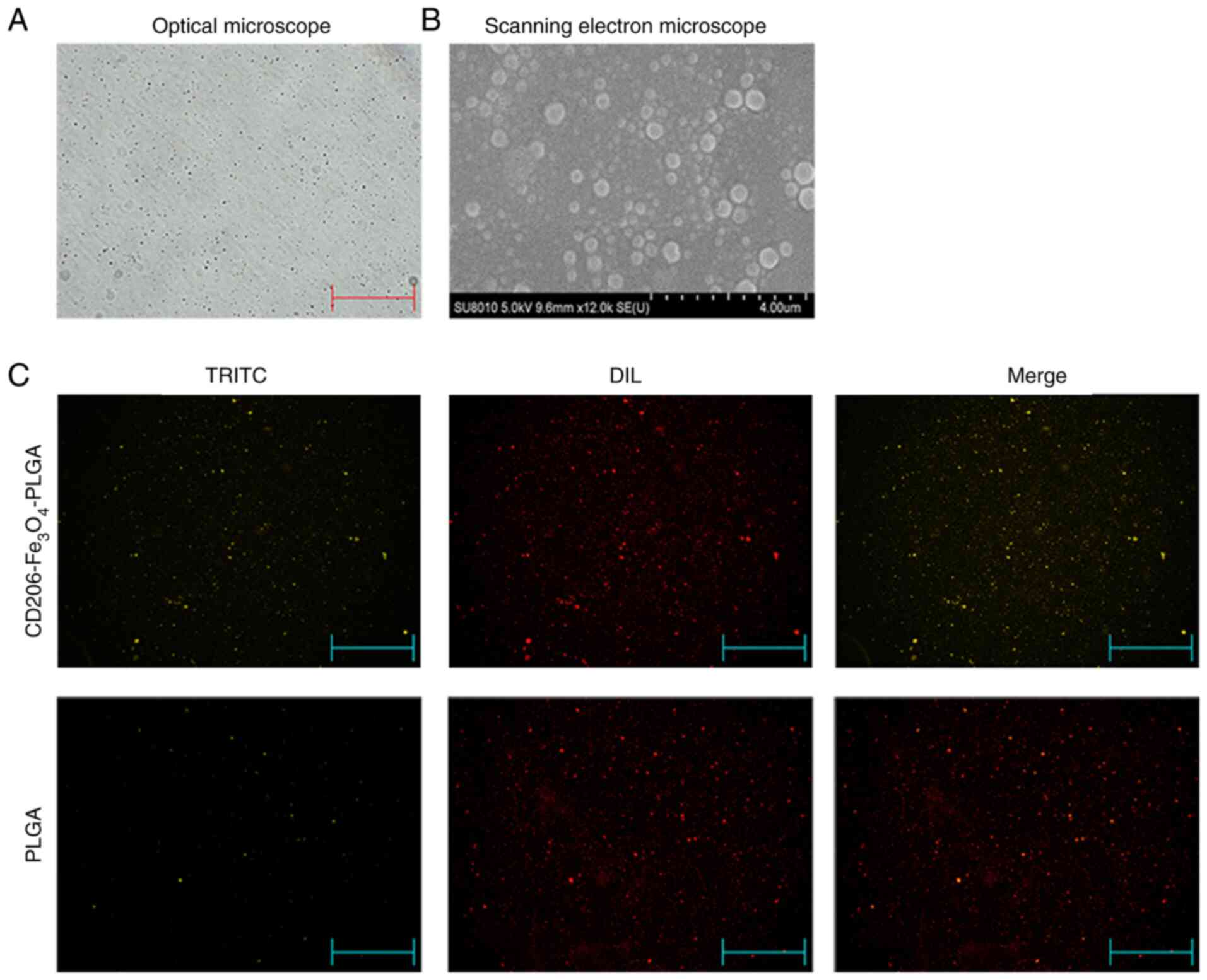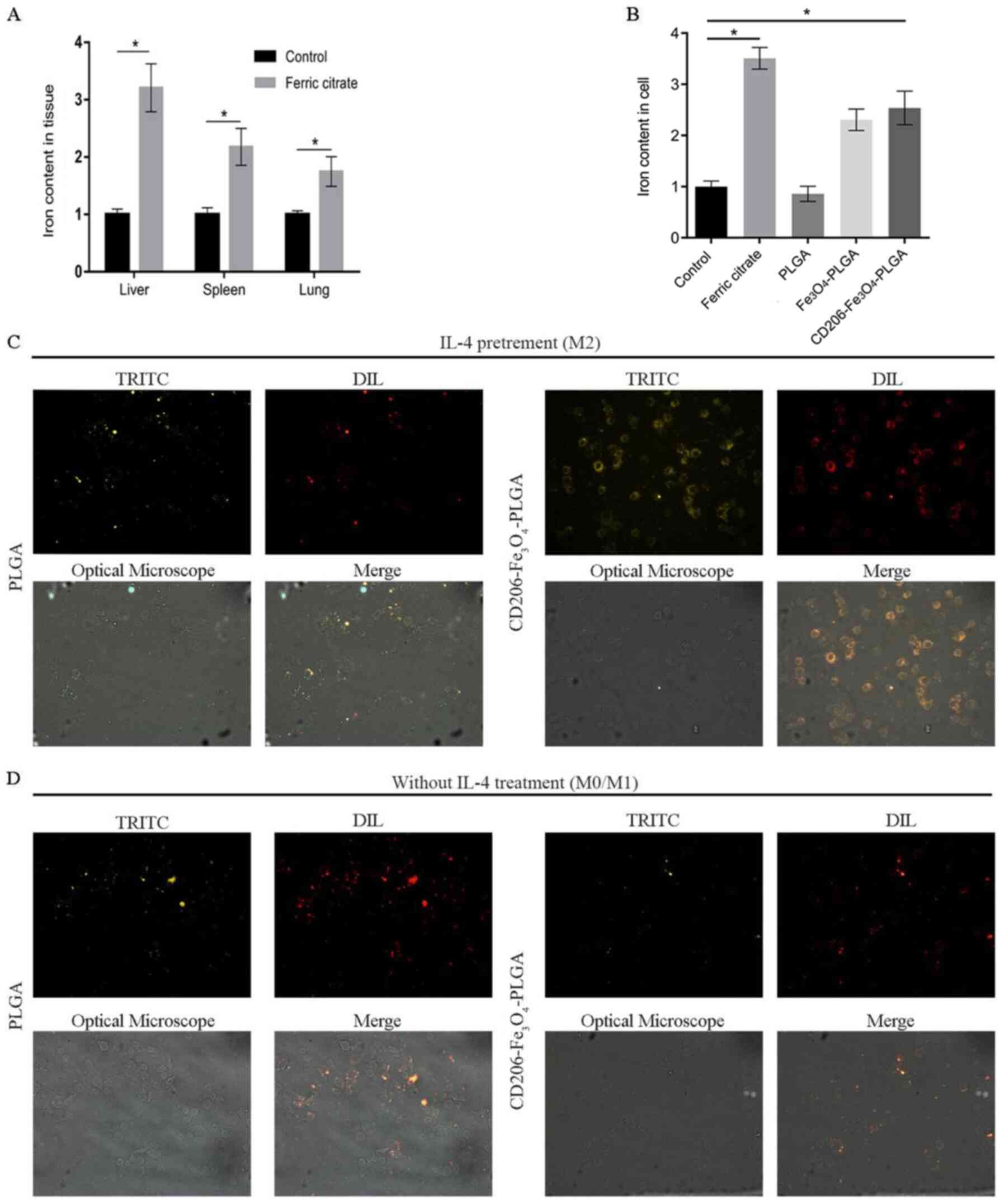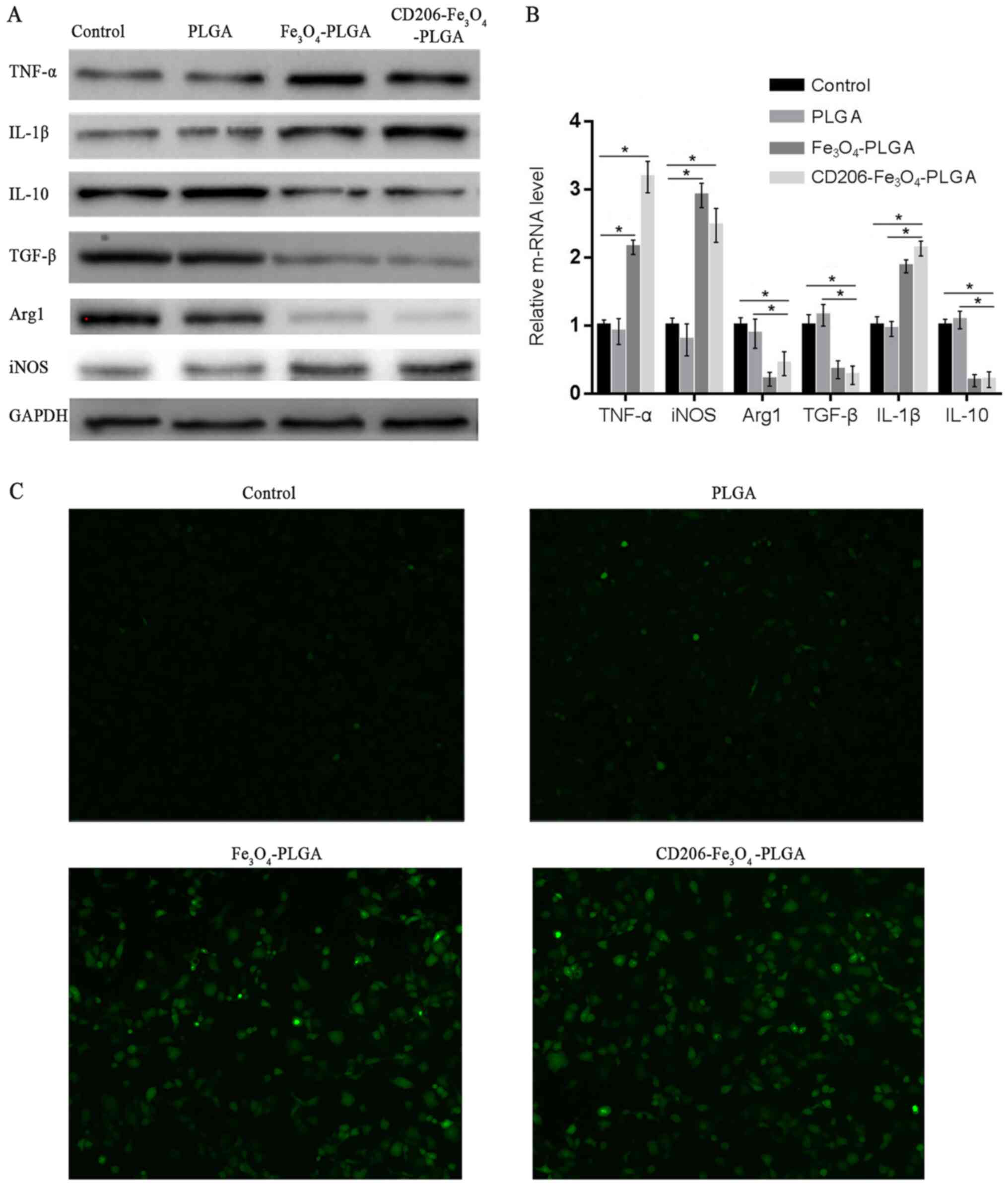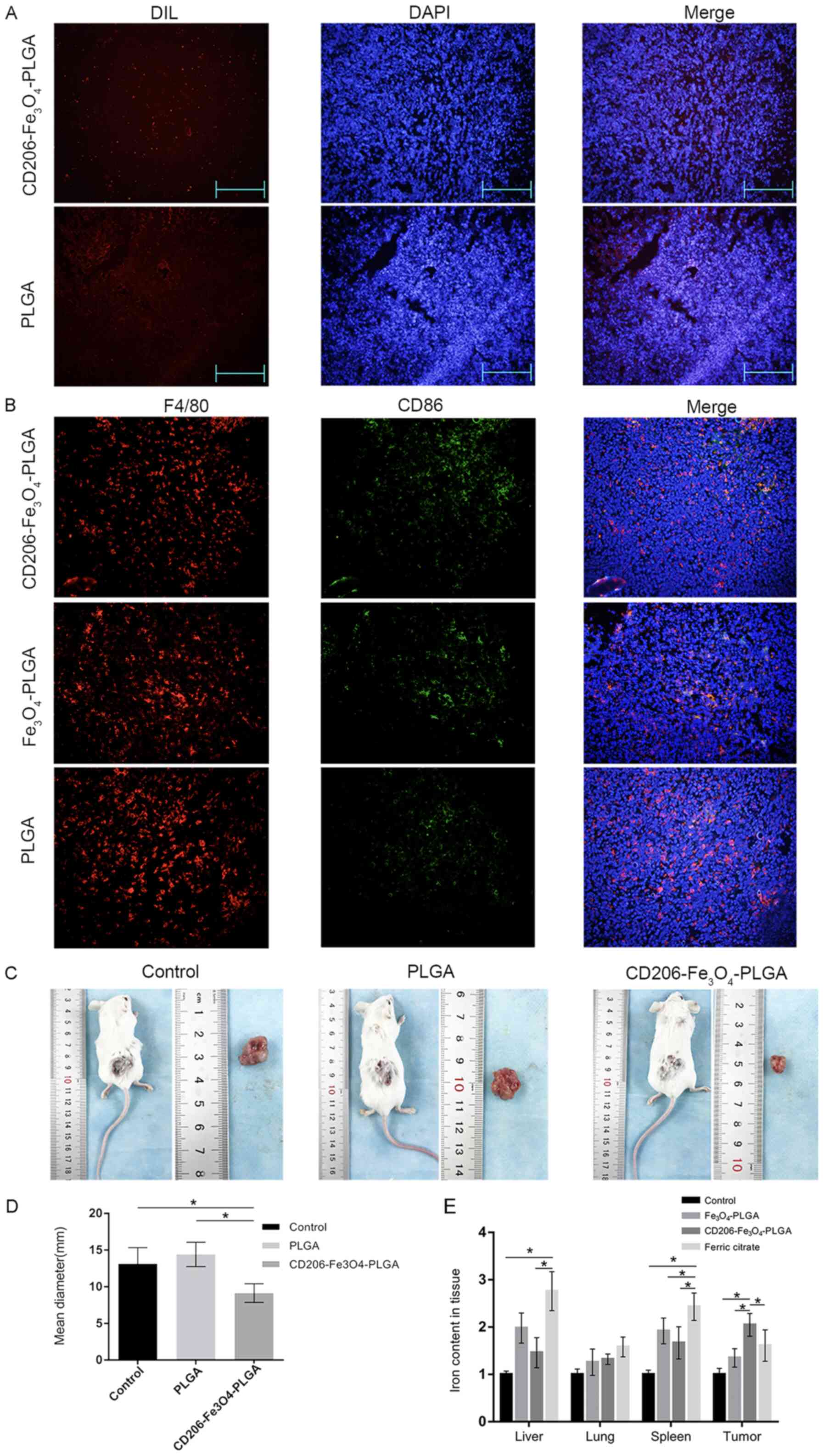|
1
|
Juhas U, Ryba-Stanisławowska M, Szargiej P
and Myśliwska J: Different pathways of macrophage activation and
polarization. Postepy Hig Med Dosw (Online). 69:496–502. 2015.
View Article : Google Scholar : PubMed/NCBI
|
|
2
|
Jung M, Mertens C and Brüne B: Macrophage
iron homeostasis and polarization in the context of cancer.
Immunobiology. 220:295–304. 2015. View Article : Google Scholar : PubMed/NCBI
|
|
3
|
Chlosta S, Fishman DS, Harrington L,
Johnson EE, Knutson MD, Wessling-Resnick M and Cherayil BJ: The
iron efflux protein ferroportin regulates the intracellular growth
of Salmonella enterica. Infect Immun. 74:3065–3067. 2006.
View Article : Google Scholar : PubMed/NCBI
|
|
4
|
Paradkar PN, De Domenico I, Durchfort N,
Zohn I, Kaplan J and Ward DM: Iron depletion limits intracellular
bacterial growth in macrophages. Blood. 112:866–874. 2008.
View Article : Google Scholar : PubMed/NCBI
|
|
5
|
Recalcati S, Locati M, Gammella E,
Invernizzi P and Cairo G.: Iron levels in polarized macrophages:
Regulation of immunity and autoimmunity. Autoimmun Rev. 11:883–889.
2012. View Article : Google Scholar : PubMed/NCBI
|
|
6
|
Lewin M, Carlesso N, Tung CH, Tang XW,
Cory D, Scadden DT and Weissleder R: Tat peptide-derivatized
magnetic nanoparticles allow in vivo tracking and recovery of
progenitor cells. Nat Biotechnol. 18:410–414. 2000. View Article : Google Scholar : PubMed/NCBI
|
|
7
|
Namdeo M, Saxena S, Tankhiwale R, Bajpai
M, Mohan YM and Bajpai SK: Magnetic nanoparticles for drug delivery
applications. J Nanosci Nanotechnol. 8:3247–3271. 2008. View Article : Google Scholar : PubMed/NCBI
|
|
8
|
Zanganeh S, Hutter G, Spitler R, Lenkov O,
Mahmoudi M, Shaw A, Pajarinen JS, Nejadnik H, Goodman S, Moseley M,
et al: Iron oxide nanoparticles inhibit tumour growth by inducing
pro-inflammatory macrophage polarization in tumour tissues. Nat
Nanotechnol. 11:986–994. 2016. View Article : Google Scholar : PubMed/NCBI
|
|
9
|
Thorek DL, Chen AK, Czupryna J and
Tsourkas A: Superparamagnetic iron oxide nanoparticle probes for
molecular imaging. Ann Biomed Eng. 34:23–38. 2006. View Article : Google Scholar : PubMed/NCBI
|
|
10
|
Laskar A, Eilertsen J, Li W and Yuan X:
SPION primes THP1 derived M2 macrophages towards M1-like
macrophages. Biochem Biophys Res Commun. 441:737–742. 2013.
View Article : Google Scholar : PubMed/NCBI
|
|
11
|
Astete C and Sabliov CM: Synthesis and
characterization of PLGA nanoparticles. J Biomater Sci Polym Ed.
17:247–289. 2006. View Article : Google Scholar : PubMed/NCBI
|
|
12
|
Kapoor DN, Bhatia A, Kaur R, Sharma R,
Kaur G and Dhawan S: PLGA: A unique polymer for drug delivery. Ther
Deliv. 6:41–58. 2015. View Article : Google Scholar : PubMed/NCBI
|
|
13
|
Postlethwait RW: Polyglycolic acid
surgical suture. Arch Surg. 101:489–494. 1970. View Article : Google Scholar : PubMed/NCBI
|
|
14
|
Khatri K, Goyal A and Vyas S: Potential of
nanocarriers in genetic immunization. Recent Pat Drug Deliv Formul.
2:68–82. 2008. View Article : Google Scholar : PubMed/NCBI
|
|
15
|
Byrne JD, Betancourt T and Brannon-Peppas
L: Active targeting schemes for nanoparticle systems in cancer
therapeutics. Adv Drug Deliv Rev. 60:1615–1626. 2008. View Article : Google Scholar : PubMed/NCBI
|
|
16
|
Gu F, Zhang L, Teply BA, Mann N, Wang A,
Radovic-Moreno AF, Langer R and Farokhzad OC: Precise engineering
of targeted nanoparticles by using self-assembled biointegrated
block copolymers. Proc Natl Acad Sci USA. 105:2586–2591. 2008.
View Article : Google Scholar : PubMed/NCBI
|
|
17
|
Maeda H: Tumor-selective delivery of
macromolecular drugs via the EPR effect: Background and future
prospects. Bioconjugate Chem. 21:797–802. 2010. View Article : Google Scholar
|
|
18
|
Xu X, Ho W, Zhang X, Bertrand N and
Farokhzad O: Cancer nanomedicine: From targeted delivery to
combination therapy. Trends Mol Med. 21:223–232. 2015. View Article : Google Scholar : PubMed/NCBI
|
|
19
|
Wang G, Griffin JI, Inturi S, Brenneman B,
Banda NK, Holers VM, Moghimi SM and Simberg D: In vitro and in vivo
differences in murine third complement component (C3) opsonization
and macrophage/leukocyte responses to antibody-functionalized iron
oxide nanoworms. Front Immunol. 8:1512017.PubMed/NCBI
|
|
20
|
Jokerst JV, Lobovkina T, Zare RN and
Gambhir SS: Nanoparticle PEGylation for imaging and therapy.
Nanomedicine (Lond). 6:715–728. 2011. View Article : Google Scholar : PubMed/NCBI
|
|
21
|
Kwon IK, Lee SC, Han B and Park K:
Analysis on the current status of targeted drug delivery to tumors.
J Controlled Release. 164:108–114. 2012. View Article : Google Scholar
|
|
22
|
Ruenraroengsak P, Cook JM and Florence AT:
Nanosystem drug targeting: Facing up to complex realities. J
Control Release. 141:265–276. 2010. View Article : Google Scholar : PubMed/NCBI
|
|
23
|
Badkas A, Frank E, Zhou Z, Jafari M,
Chandra H, Sriram V, Lee JY and Yadav JS: Modulation of in vitro
phagocytic uptake and immunogenicity potential of modified
Herceptin®-conjugated PLGA-PEG nanoparticles for drug
delivery. Colloids Surf B Biointerfaces. 162:271–278. 2018.
View Article : Google Scholar : PubMed/NCBI
|
|
24
|
Allen TM: Ligand-targeted therapeutics in
anticancer therapy. Nat Rev Cancer. 2:750–763. 2002. View Article : Google Scholar : PubMed/NCBI
|
|
25
|
Peer D, Karp JM, Hong S, Farokhzad OC,
Margalit R and Langer R: Nanocarriers as an emerging platform for
cancer therapy. Nat Nanotechnol. 2:751–760. 2007. View Article : Google Scholar : PubMed/NCBI
|
|
26
|
Kamaly N, Yameen B, Wu J and Farokhzad OC:
Degradable controlled-release polymers and polymeric nanoparticles:
Mechanisms of controlling drug release. Chem Rev. 116:2602–2663.
2016. View Article : Google Scholar : PubMed/NCBI
|
|
27
|
Moura CC, Segundo MA, Neves Jd, Reis S and
Sarmento B: Co-association of methotrexate and SPIONs into
anti-CD64 antibody-conjugated PLGA nanoparticles for theranostic
application. Int J Nanomedicine. 9:4911–4922. 2014.PubMed/NCBI
|
|
28
|
Livak KJ and Schmittgen TD: Analysis of
relative gene expression data using real-time quantitative PCR and
the 2(-Delta Delta C(T)) method. Methods. 25:402–408. 2001.
View Article : Google Scholar : PubMed/NCBI
|
|
29
|
Zhou Y, Que KT, Zhang Z, Yi ZJ, Zhao PX,
You Y, Gong JP and Liu ZJ: Iron overloaded polarizes macrophage to
proinflammation phenotype through ROS/acetylp53 pathway. Cancer
Med. 7:4012–4022. 2018. View Article : Google Scholar : PubMed/NCBI
|
|
30
|
DeNardo DG, Brennan DJ, Rexhepaj E,
Ruffell B, Shiao SL, Madden SF, Gallagher WM, Wadhwani N, Keil SD,
Junaid SA, et al: Leukocyte complexity predicts breast cancer
survival and functionally regulates response to chemotherapy.
Cancer Discov. 1:54–67. 2011. View Article : Google Scholar : PubMed/NCBI
|
|
31
|
Wang Y, Yu L, Ding J and Chen Y: Iron
metabolism in cancer. Int J Mol Sci. 20:952018. View Article : Google Scholar
|
|
32
|
Duan X, He K, Li J, Cheng M, Song H, Liu J
and Liu P.: Tumor associated macrophages deliver iron to tumor
cells via Lcn2. Int J Physiol Pathophysiol Pharmacol. 10:105–114.
2018.PubMed/NCBI
|
|
33
|
Pinnix ZK, Miller LD, Wang W, D'Agostino R
Jr, Kute T, Willingham MC, Hatcher H, Tesfay L, Sui G, Di X, et al:
Ferroportin and iron regulation in breast cancer progression and
prognosis. Sci Transl Med. 2:43ra562010. View Article : Google Scholar : PubMed/NCBI
|
|
34
|
Majewska U, Banaś D, Braziewicz J, Góźdź
S, Kubala-Kukuś A and Kucharzewski M: Trace element concentration
distributions in breast, lung and colon tissues. Phys Med Biol.
52:3895–3911. 2007. View Article : Google Scholar : PubMed/NCBI
|
|
35
|
Torti SV and Torti FM: Iron and cancer:
More ore to be mined. Nat Rev Cancer. 13:342–355. 2013. View Article : Google Scholar : PubMed/NCBI
|
|
36
|
Shen L, Zhao HY, Du J and Wang F:
Anti-tumor activities of four chelating agents against human
neuroblastoma cells. In Vivo. 19:233–236. 2005.PubMed/NCBI
|
|
37
|
Li P, Zheng X, Shou K, Niu Y, Jian C, Zhao
Y, Yi W, Hu X and Yu A: The iron chelator Dp44mT suppresses
osteosarcoma's proliferation, invasion and migration: In vitro and
in vivo. Am J Transl Res. 8:5370–5385. 2016.PubMed/NCBI
|
|
38
|
Tsai SH, Huang PH, Hsu YJ, Peng YJ, Lee
CH, Wang JC, Chen JW and Lin SJ: Inhibition of hypoxia inducible
factor-1α attenuates abdominal aortic aneurysm progression through
the down-regulation of matrix metalloproteinases. Sci Rep.
6:286122016. View Article : Google Scholar : PubMed/NCBI
|
|
39
|
Kontoghiorghes GJ: Ethical issues and
risk/benefit assessment of iron chelation therapy: Advances with
deferiprone/deferoxamine combinations and concerns about the
safety, efficacy and costs of deferasirox. Hemoglobin. 32:1–15.
2008. View Article : Google Scholar : PubMed/NCBI
|
|
40
|
Di Nicola M, Barteselli G, Dell'Arti L,
Ratiglia R and Viola F: Functional and structural abnormalities in
deferoxamine retinopathy: A review of the literature. Biomed Res
Int. 2015:2496172015. View Article : Google Scholar
|
|
41
|
Hamilton JL, Hatef A, Imran ul-Haq M, Nair
N, Unniappan S and Kizhakkedathu JN: Clinicallyapproved iron
chelators influence zebrafish mortality, hatching morphology and
cardiac function. PLoS One. 9:e1098802014. View Article : Google Scholar : PubMed/NCBI
|
|
42
|
Xie J, Huang J, Li X, Sun S and Chen X:
Iron oxide nanoparticle platform for biomedical applications. Curr
Med Chem. 16:1278–1294. 2009. View Article : Google Scholar : PubMed/NCBI
|
|
43
|
Mou Y, Chen B, Zhang Y, Hou Y, Xie H, Xia
G, Tang M, Huang X, Ni Y and Hu Q: Influence of synthetic
superparamagnetic iron oxide on dendritic cells. Int J
Nanomedicine. 6:1779–1786. 2011.PubMed/NCBI
|
|
44
|
Verdijk P, Scheenen TW, Lesterhuis WJ,
Gambarota G, Veltien AA, Walczak P, Scharenborg NM, Bulte JWM, Punt
CJA, Heerschap A, et al: Sensitivity of magnetic resonance imaging
of dendritic cells for in vivo tracking of cellular cancer
vaccines. Int J Cancer. 120:978–984. 2006. View Article : Google Scholar
|
|
45
|
Rojas JM, Sanz-Ortega L, Mulens-Arias V,
Gutiérrez L, Pérez-Yagüe S and Barber DF: Superparamagnetic iron
oxide nanoparticle uptake alters M2 macrophage phenotype, iron
metabolism, migration and invasion. Nanomedicine. 12:1127–1138.
2016. View Article : Google Scholar : PubMed/NCBI
|
|
46
|
Shen CC, Liang HJ, Wang CC, Liao MH and
Jan TR: A role of cellular glutathione in the differential effects
of iron oxide nanoparticles on antigen-specific T cell cytokine
expression. Int J Nanomedicine. 6:2791–2798. 2011.PubMed/NCBI
|
|
47
|
Leftin A, Ben-Chetrit N, Klemm F, Joyce JA
and Koutcher JA: Iron imaging reveals tumor and metastasis
macrophage hemosiderin deposits in breast cancer. PLoS One.
12:e01847652017. View Article : Google Scholar : PubMed/NCBI
|
|
48
|
Saengruengrit C, Ritprajak P,
Wanichwecharungruang S, Sharma A, Salvan G, Zahn DRT and Insin N:
The combined magnetic field and iron oxide-PLGA composite
particles: Effective protein antigen delivery and immune
stimulation in dendritic cells. J Colloid Interface Sci.
520:101–111. 2018. View Article : Google Scholar : PubMed/NCBI
|


















